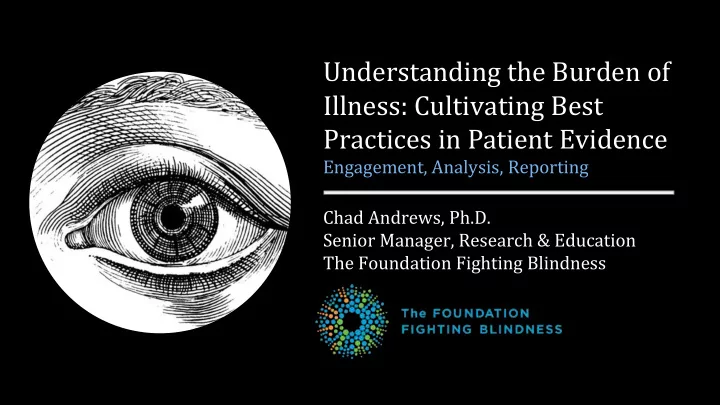

Understanding the Burden of Illness: Cultivating Best Practices in Patient Evidence Engagement, Analysis, Reporting Chad Andrews, Ph.D. Senior Manager, Research & Education The Foundation Fighting Blindness
Disclosure I have the following relevant financial relationships to disclose: ● The majority of financial support for the Foundation Fighting Blindness comes from individual donors. ● Support through unrestricted grants and/or sponsorships comes from: AGTC, Allergan, Bayer, BMO, CIBC, Glaukos, I-MED Pharma, MEDEC, MeiraGTx, Novartis, RBC Foundation, Shire, Spark Therapeutics, Specialty Pharma Solutions.
Research Methods: Engagement, Analysis, Reporting CHALLENGE 1: A NEW PARADIGM ● Treating patient perspectives as legitimate evidence is part of a relatively new paradigm ● As such, high-quality research on patient perspectives is limited ● Result: No strong consensus on research methodology or best practices ● CADTH’s recent HQA of MIGS (section: “Patient Preferences and Experience Review”) found that out of 67 relevant studies, 15 met the inclusion criteria, and after critical appraisal only one was deemed “credible,” three “trustworthy,” and three “transferable.”
“Patient -centered medicine and patient- oriented research: improving health outcomes for individual patients” ( BMC Medical Informatics and Decision Making . 2013. 13: 6.) José A Sacristán
Research Methods: Engagement, Analysis, Reporting CHALLENGE 2: POTENTIAL BIASES “Six ‘biases’ against patients and carers in evidence - based medicine” ( BMC Med . 2015. 13: 200.) Corresponding author: Rosamund Snow 1. Limited patient input into research design 1. Patient experience undervalued in the hierarchy of evidence 1. Conflation of patient consulting with use of decision tools 1. Underestimation of power imbalances 1. Overemphasis on clinical consultation 1. Unbalanced focus on patients who seek and obtain care
Research Methods: Engagement, Analysis, Reporting CASE STUDY 1: DIABETIC MACULAR EDEMA PATIENT STUDY ● Research conducted in 2017 ● Engagement mechanism was a 10-minute online survey ● Survey was completed by 64 Canadians, each screened to ensure they either a) self-confirm having DME, or b) self- confirm a diabetes diagnosis and a history of injections
Research Methods: Engagement, Analysis, Reporting REPORTING THE DME EXPERIENCE: CADTH Patient Input Submission: Ozurdex (dexamethasone) Sample: ● What stands out clearly in the collected survey data is that DME has a significant impact on the daily lives of those living with the disease, with nearly half of the surveyed patients reporting that their lives are affected in some way by the condition, often in the form of a high impact on their ability to participate in work and school activities. Patients also reported that their DME impacts them nearly as much as other chronic and costly conditions such as COPD, cancer, and depression.
Research Methods: Engagement, Analysis, Reporting CASE STUDY 2: GLAUCOMA PATIENT STUDY ● Research conducted in 2018 ● Engagement mechanism was a 10-minute online survey ● Survey was completed by 213 Canadians, each of whom reported being diagnosed with glaucoma
Research Methods: Engagement, Analysis, Reporting REPORTING THE GLAUCOMA EXPERIENCE: Feedback on CADTH’s “Optimal Use of Minimally Invasive Glaucoma Surgery: A Health Technology Assessment” Sample: ● A general lack of detailed information in the CADTH draft on the daily challenges associated with living with glaucoma heightens the sense of a gap in our understanding of glaucoma’s burden on patients. Responding to the question “What are the daily challenges you face living with glaucoma?” our survey respondents selected a wide range of challenges, with many selecting multiple. These included “no daily challenges” (40%), “difficulty reading” (40%), “frequent visits to the eye doctor” (37%), “not able to drive” (26%), “depression” (15%), “difficulty cooking” (11%), and “general mobility” (10%). Many of those who selected “other” (29%) provided insights that illustrate how complex their daily challenges are, including “Need enlarged monitor with computer,” “have hard time seeing if dishes I was are clean, vacuuming, wash floors - close- up work,” “problems with depth perception, tripping,” “Difficulty walking through busy public areas, people bumping into you,” “Regular Medication + Interventions,” and “Anxiety.”
Recommend
More recommend